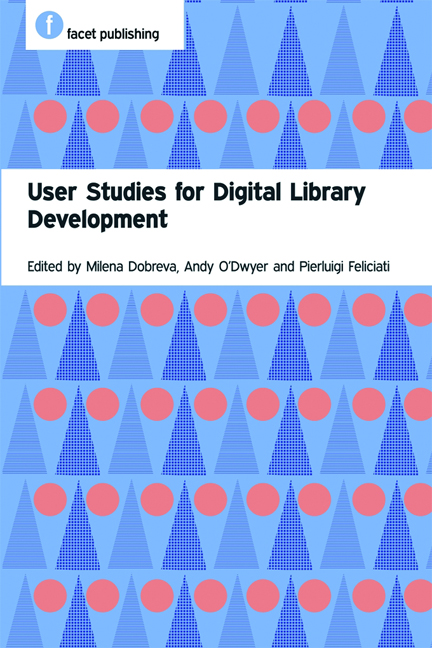Book contents
- Frontmatter
- Contents
- Preface
- Acknowledgements
- Abbreviations
- Glossary
- 1 Introduction: user studies for digital library development
- PART 1 SETTING THE SCENE
- PART 2 METHODS EXPLAINED AND ILLUSTRATED
- PART 3 USER STUDIES IN THE DIGITAL LIBRARY UNIVERSE: WHAT ELSE NEEDS TO BE CONSIDERED?
- PART 4 USER STUDIES ACROSS THE CULTURAL HERITAGE SECTOR
- 18 User studies in libraries
- 19 User studies in archives
- 20 User studies in museums: holding the museum in the palm of your hand
- 21 Digital art online: perspectives on user needs, access, documentation and retrieval
- 22 User studies for digital libraries’ development: audiovisual collections
- 23 A business-model perspective on end-users and open metadata
- PART 5 PUTTING IT ALL TOGETHER
- Index
19 - User studies in archives
from PART 4 - USER STUDIES ACROSS THE CULTURAL HERITAGE SECTOR
Published online by Cambridge University Press: 08 June 2018
- Frontmatter
- Contents
- Preface
- Acknowledgements
- Abbreviations
- Glossary
- 1 Introduction: user studies for digital library development
- PART 1 SETTING THE SCENE
- PART 2 METHODS EXPLAINED AND ILLUSTRATED
- PART 3 USER STUDIES IN THE DIGITAL LIBRARY UNIVERSE: WHAT ELSE NEEDS TO BE CONSIDERED?
- PART 4 USER STUDIES ACROSS THE CULTURAL HERITAGE SECTOR
- 18 User studies in libraries
- 19 User studies in archives
- 20 User studies in museums: holding the museum in the palm of your hand
- 21 Digital art online: perspectives on user needs, access, documentation and retrieval
- 22 User studies for digital libraries’ development: audiovisual collections
- 23 A business-model perspective on end-users and open metadata
- PART 5 PUTTING IT ALL TOGETHER
- Index
Summary
Introduction
Traditionally, archivists gained knowledge of their users’ needs while conducting reference sessions or exit interviews. With the advent of digital archives, interest in using formal methods to study the information behaviour of archival users has increased. As Hill points out, remote users are often anonymous. ‘Physical users are easy to count, able to make their needs known in fairly straightforward ways … remote users are harder to find out about’ (Hill, 2004, 139). Furthermore, users often have very limited understanding of archival descriptive practices or terminology and therefore they require systems that are user friendly and selfexplanatory and support independent searching and retrieval. Designing these systems depends upon gaining indepth knowledge of the informationseeking behaviour of all types of archival users and studying the usability of archival systems.
Archivists have traditionally dedicated little time and attention to studying their users; archivists focus, first and foremost, on the care and preservation of records, and only secondarily on the records’ use. Eastwood (1997) suggests that an archivist's primary role is to protect the integrity of records; therefore, providing access to records must come after they have ensured the preservation of records. Moreover, Cook (1990/91) warns against turning the archives ‘into the McDonald's of Information, where everything is carefully measured to meet every customer profile and every market demographic’ (p. 127). Cook suggests that archivists should not modify their acquisition policies or descriptive practices to meet what users think they need. He posits that archivists provide better service if they meet users’ needs, rather than users’ wants:
Every user from the genealogist looking for a single fact or a copy of a single document through the most sophisticated researcher using ‘discourse’ methodology would benefit from this materialscentred approach to archives. The genealogist should not just be handed the land patent or the record of entry relating to his or her ancestor, even if such service can be a quick oneminute ‘strike’. Rather, the user should also be led to information about the contextual significance of that document. What is a land patent; what was the process by which it was issued …
(Cook, 1990/91, 130–1)- Type
- Chapter
- Information
- User Studies for Digital Library Development , pp. 199 - 206Publisher: FacetPrint publication year: 2012
- 2
- Cited by



